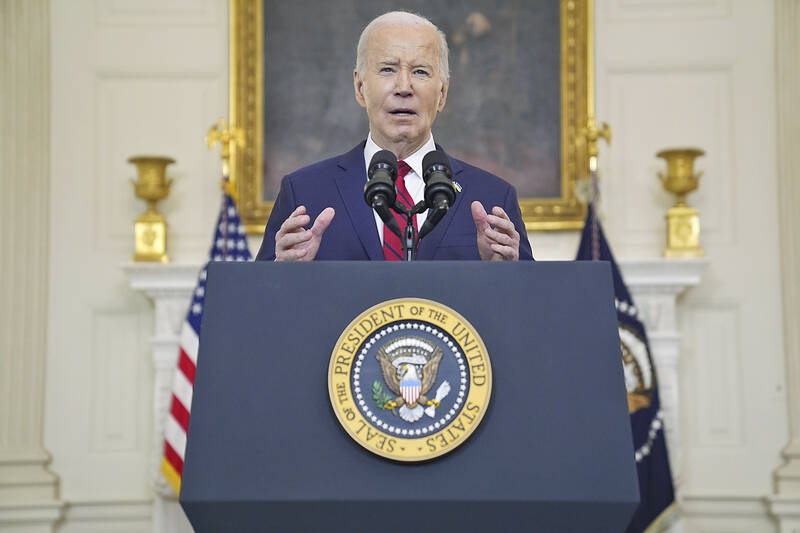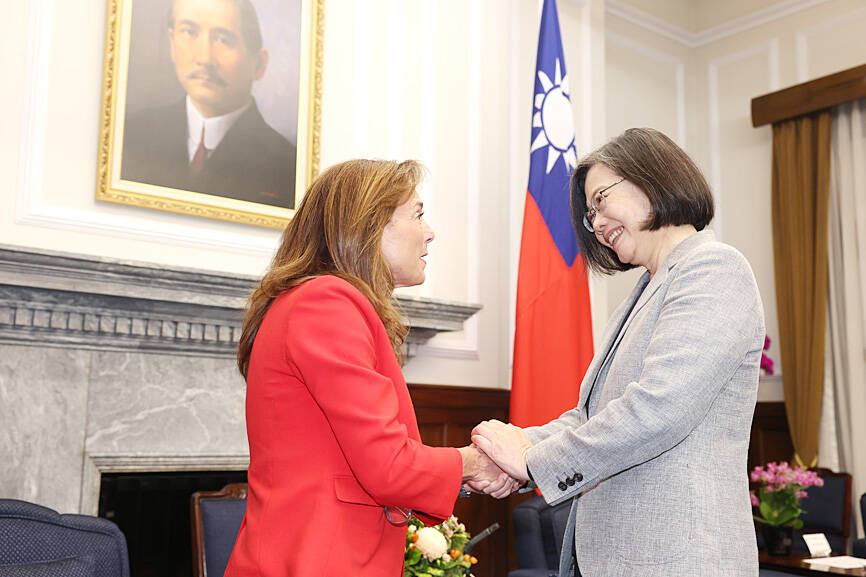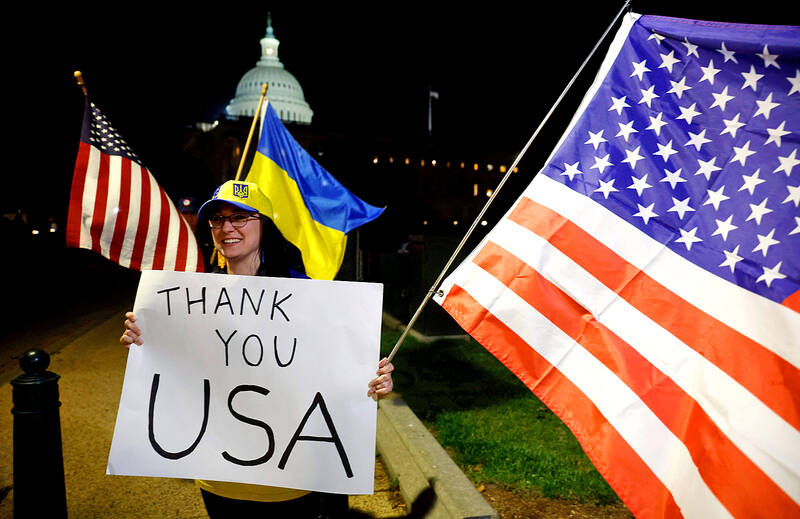The US Senate on Tuesday approved US$95 billion in aid to Taiwan, Ukraine and Israel, with the package of bills containing the funding expected to be signed into law after press time last night.
The Senate passed the bills in a 79-18 vote after the US House of Representatives on Saturday approved the package, which US President Joe Biden said he would sign.
“Tonight, a bipartisan majority in the Senate joined the House to answer history’s call at this critical inflection point,” Biden said.

Photo: AP
The legislation would send US$26 billion in wartime assistance to Israel and humanitarian relief to citizens of Gaza, and US$8 billion to counter Chinese threats to Taiwan and in the Indo-Pacific.
US officials said that about US$1 billion of the aid package could be on its way shortly, with the bulk following in coming weeks.
In Taipei yesterday, President Tsai Ing-wen (蔡英文) thanked the US for its support, including the Senate’s action, in a meeting with a US delegation.

Photo: CNA
Taiwan will continue to work with the US and other countries to bolster the “pan-democratic alliance,” and create global prosperity and stability, Tsai told the delegation at the Presidential Office.
Tsai thanked the delegation, which comprises US representatives Lisa McClain, Dan Kildee and Mark Alford, for their efforts to advance legislation that would support Taiwan’s participation on the international stage.
She also thanked the US House of Representatives for its work to advance the Indo-Pacific Security Supplemental Appropriations Act, which would allocate funding for continued Taiwan-US collaboration.

Photo: AFP
Tsai also thanked the delegation members for their roles in enhancing Taiwan-US collaboration.
With this year marking 45 years since the US’ Taiwan Relations Act became law, Taiwan and the US should boost their collaborations to contribute to peace and stability in the Indo-Pacific region, and to limit authoritarian expansion, she said.
Tsai reiterated the nation’s gratitude for Washington’s military sales to Taiwan based on the “six assurances” and the Taiwan Relations Act.
In addition to completing the first batch of agreements under the US-Taiwan Initiative on 21st-Century Trade, hopefully the US-Taiwan Expedited Double-Tax Relief Act would be finalized soon, Tsai said, adding that the two sides are important trade partners.

CHAOS: Iranians took to the streets playing celebratory music after reports of Khamenei’s death on Saturday, while mourners also gathered in Tehran yesterday Iranian Supreme Leader Ayatollah Ali Khamenei was killed in a major attack on Iran launched by Israel and the US, throwing the future of the Islamic republic into doubt and raising the risk of regional instability. Iranian state television and the state-run IRNA news agency announced the 86-year-old’s death early yesterday. US President Donald Trump said it gave Iranians their “greatest chance” to “take back” their country. The announcements came after a joint US and Israeli aerial bombardment that targeted Iranian military and governmental sites. Trump said the “heavy and pinpoint bombing” would continue through the week or as long

TRUST: The KMT said it respected the US’ timing and considerations, and hoped it would continue to honor its commitments to helping Taiwan bolster its defenses and deterrence US President Donald Trump is delaying a multibillion-dollar arms sale to Taiwan to ensure his visit to Beijing is successful, a New York Times report said. The weapons sales package has stalled in the US Department of State, the report said, citing US officials it did not identify. The White House has told agencies not to push forward ahead of Trump’s meeting with Chinese President Xi Jinping (習近平), it said. The two last month held a phone call to discuss trade and geopolitical flashpoints ahead of the summit. Xi raised the Taiwan issue and urged the US to handle arms sales to

BIG SPENDERS: Foreign investors bought the most Taiwan equities since 2005, signaling confidence that an AI boom would continue to benefit chipmakers Taiwan Semiconductor Manufacturing Co’s (TSMC, 台積電) market capitalization swelled to US$2 trillion for the first time following a 4.25 percent rally in its American depositary receipts (ADR) overnight, putting the world’s biggest contract chipmaker sixth on the list of the world’s biggest companies by market capitalization, just behind Amazon.com Inc. The site CompaniesMarketcap.com ranked TSMC ahead of Saudi Aramco and Meta Platforms Inc. The Taiwanese company’s ADRs on Tuesday surged to US$385.75 on the New York Stock Exchange, as strong demand for artificial intelligence (AI) applications led to chip supply constraints and boost revenue growth to record-breaking levels. Each TSMC ADR represents

State-run CPC Corp, Taiwan (CPC, 台灣中油) yesterday said that it had confirmed on Saturday night with its liquefied natural gas (LNG) and crude oil suppliers that shipments are proceeding as scheduled and that domestic supplies remain unaffected. The CPC yesterday announced the gasoline and diesel prices will rise by NT$0.2 and NT$0.4 per liter, respectively, starting Monday, citing Middle East tensions and blizzards in the eastern United States. CPC also iterated it has been reducing the proportion of crude oil imports from the Middle East and diversifying its supply sources in the past few years in response to geopolitical risks, expanding